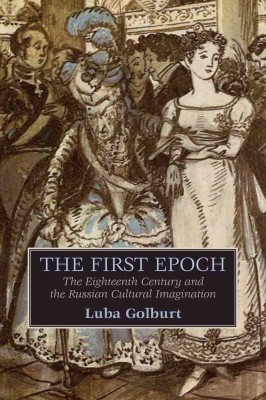| The First Epoch: The Eighteenth Century and the Russian Cultural Imagination Contributor(s): Golburt, Luba (Author) |
|
 |
ISBN: 0299298140 ISBN-13: 9780299298142 Publisher: University of Wisconsin Press OUR PRICE: $28.45 Product Type: Paperback - Other Formats Published: July 2014 |
| Additional Information |
| BISAC Categories: - Literary Criticism | Russian & Former Soviet Union - History | Russia & The Former Soviet Union - History | Modern - 18th Century |
| Dewey: 891.709 |
| LCCN: 2013027990 |
| Series: Wisconsin Center for Pushkin Studies |
| Physical Information: 0.9" H x 6" W x 9" (1.19 lbs) 402 pages |
| Themes: - Cultural Region - Russia - Chronological Period - 18th Century - Sex & Gender - Feminine |
| Descriptions, Reviews, Etc. |
| Publisher Description: Modern Russian literature has two "first" epochs: secular literature's rapid rise in the eighteenth century and Alexander Pushkin's Golden Age in the early nineteenth. In the shadow of the latter, Russia's eighteenth-century culture was relegated to an obscurity hardly befitting its actually radical legacy. And yet the eighteenth century maintains an undeniable hold on the Russian historical imagination to this day. Luba Golburt's book is the first to document this paradox. In formulating its self-image, the culture of the Pushkin era and after wrestled far more with the meaning of the eighteenth century, Golburt argues, than is commonly appreciated. Why did nineteenth-century Russians put the eighteenth century so quickly behind them? How does a meaningful present become a seemingly meaningless past? Interpreting texts by Lomonosov, Derzhavin, Pushkin, Viazemsky, Turgenev, Tolstoy, and others, Golburt finds surprising answers, in the process innovatively analyzing the rise of periodization and epochal consciousness, the formation of canon, and the writing of literary history. Winner, Marc Raeff Book Prize, Eighteenth-Century Russian Studies Association Winner, Heldt Prize for the Best Book by a Woman in Slavic/Eastern European/Eurasian Studies, Association for Women in Slavic Studies Winner, Best Book in Literary and Cultural Studies, American Association of Teachers of Slavic and Eastern European Languages |